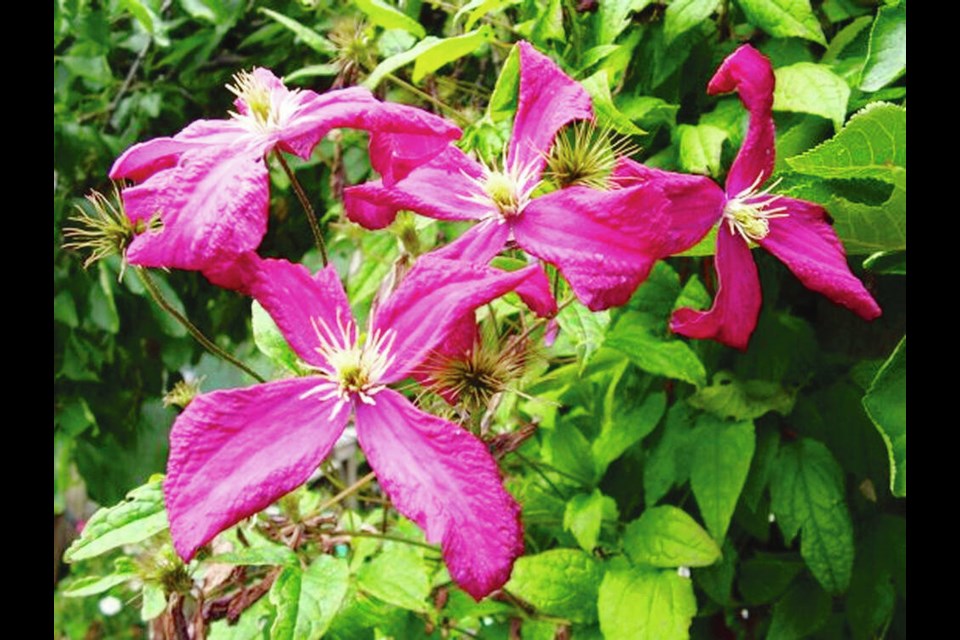Dear Helen: Because it is always severely winter damaged and has required constant pruning, we are removing an evergreen clematis from a wire trellis. Can you suggest a replacement clematis that is not evergreen, has more delicate leaves, and will grow well on the wire support?
W.N.
For their ease of care and prolific bloom, I’m very fond of the small-flowered clematis types, in particular the Viticellas. The only pruning they require is cutting down close to the ground in late winter. Among the Clematis viticella varieties, Mme. Julia Correvon is a star, with deep wine-red flowers all summer long. It grows quickly to cover a support.
Dear Helen: What pest might have caused damage to some of my apples last year? I’d appreciate help in identifying the possible pest and suggestions on how to prevent a repeat of the damage.
W.A.
The two main pests that target apples are coddling moth and apple maggot. You can tell which one you are dealing with by the nature of the damage.
Coddling moths emerge soon after apple blossom time to lay eggs on and near developing fruit. The eggs hatch into larvae that bore into the core of the small apples to feed in the core for around a month before crawling out to pupate and produce a second generation of egg-laying adults in July and August.
Apple maggot flies emerge in early summer. The females pierce the fruit to lay eggs in July, August and September. The eggs hatch into larvae that make a maze of thin tunnels as they feed on the flesh. The fruit rots quickly. There is one generation.
One tunnel in and out of an apple core signifies coddling moth. Whole sections of browned flesh indicate apple maggot.
Monitoring the trees carefully and removing fallen and suspect fruit is useful in home gardens. Keeping trees compact with summer pruning makes monitoring manageable. Pruning in late winter stimulates vigorous growth.
Monitoring for coddling moth involves watching from the time the apples are marble size for entry holes. Remove and destroy suspect and fallen apples. After a tree sheds excess fruit in the “June drop” thin the apples to leave just one to a cluster.
Larvae can be trapped as they move down the tree trunk to pupate. In early June, wrap a 20-cm wide band of corrugated cardboard (corrugation against the tree) around the trunk. Some of the larvae will stop to spin cocoons in the bands. Check every 10 days for cocoons and larvae to pick out. Replace with fresh bands in mid-July, to trap the second generation as it moves down to pupate.
As with coddling moth, monitoring for and physical removal of suspect apples works well for apple maggot. Watch for fruit with tiny dimples where eggs have been inserted. Remove and destroy affected apples, along with all fallen fruit.
Both pests over-winter in the soil and leaf litter under and around the tree. Keeping the area at the base of the trunk and in the space under a tree scrupulously cleaned is helpful.
GARDEN EVENTS
View Royal meeting. The View Royal Garden Club will meet this evening (Wednesday, May 24) at 7:30 in Wheeley Hall, behind Esquimalt United Church, 500 Admirals Rd. Entrance off Lyall St. Joshua Clae Wagler of Edible Landscape Design will describe how home landscapes can be transformed into foodscapes. Joshua’s background in urban studies has involved work in food forestry, pemaculture, homesteading and more. Non-member drop-in fee $5. viewroyalgardenclub.ca.
CED Workshops. The Compost Education Centre, 1216 North Park St. in Victoria, is offering the following workshops. For information and registration, call 250-386-9676, email [email protected], or go online at compost.bc.ca/publicworkshops.
* Soil: Really Important Tiny Lives on Saturday, May 27, 10 a.m. to 12 p.m. Learn about soil as an ecosystem that supports plant life and is vital to all life on earth. Discover the most effective ways to steward this living medium.
* Composting Basics on Saturday, June 3, 10 a.m. to 12 p.m. Learn the recipe for success in producing compost that is rich in beneficial microorganisms and nutrients.
* Winter Vegetable Growing, Saturday, June 3, 1 to 3 p.m. Our climate makes it possible to harvest produce from our gardens during the dark days of winter. Learn when to sow seeds for the vegetables you want and how to protect the plants in winter.



